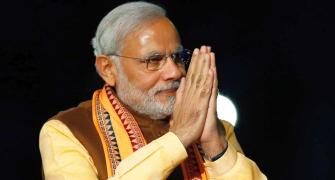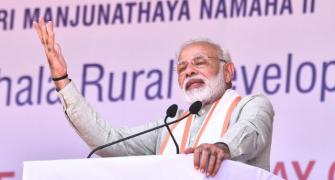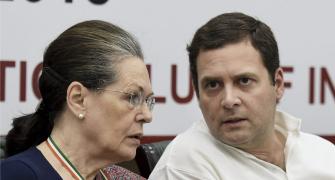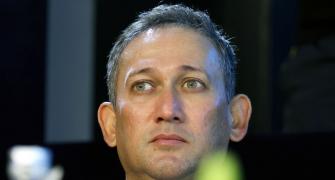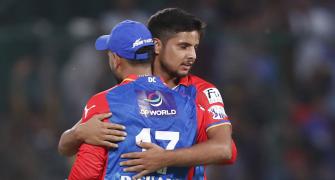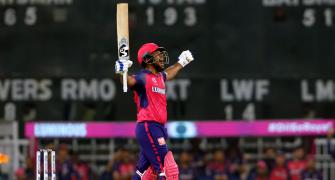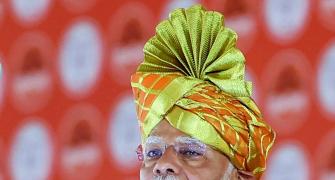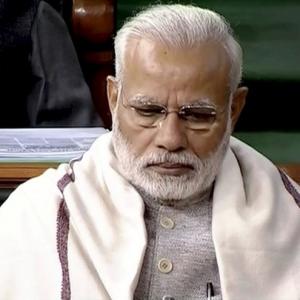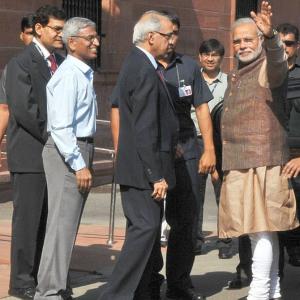'Despite the BJP's successes at the state-level, replicating their 282-seat majority in 2019 is going to be an uphill climb.'
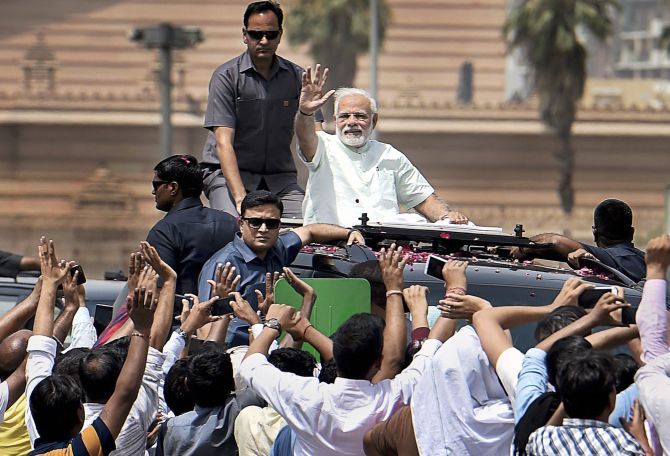
The recent CSDS-Lokniti Mood of the Nation poll, conducted just as the Bharatiya Janata Party-led National Democratic Alliance government completed four years, reveals that the BJP remains the voters 'favourite party in most of the large and electorally important states of the country.
"Four years after coming to power, the prime minister remains a towering figure. That's nothing to sneeze at," Milan Vaishnav, Director and Senior Fellow, South Asia Program, Carnegie Endowment for International Peace, tells Rediff.com/Archana Masih.
What does the Karnataka result mean for Mr Modi? How strong is his position for himself and BJP for 2019?
One should always be cautious in deriving grand lessons from one election. But post-Karnataka, a few things have become clearer.
First, Modi remains incredibly popular. Workers from all parties agree that Modi's campaigning during the latter stage of the contest did propel the BJP and enhance their voter mobilisation efforts.
Four years after coming to power, the prime minister remains a towering figure. That's nothing to sneeze at.
Second, the BJP's exceptional dominance in state elections over the past four years is contributing to greater Opposition coordination and collaboration as the latter's backs are pressed against the wall.
The lesson is: Hang together and we just might have a shot at beating the BJP.
The union of the Janata Dal-Secular and the Congress is an opportunistic marriage of convenience to keep the BJP out of power.
This was the same model the Mahagatbandhan used in Bihar in 2015 and the Samajwadi Party and the Bahujan Samaj Party utilised in the recent Uttar Pradesh Lok Sabha by-elections (although the latter two were pre-election, rather than post-election, alliances).
Third, Modi is punching above the weight of his party. That is, he is more popular than his party's brand.
For this reason, Modi's incentive is to presidentialise the 2019 election while the Opposition's objective is to localise it.
In the long term, this poses a danger: If Modi loses popularity, the BJP could be in trouble.
You wrote that Indian democracy is in a delicate position. How has it weakened? What are the institutions that according to you are in peril?
The Karnataka election put a spotlight on the underbelly of Indian democracy in several respects.
First, the campaign was about personal attacks, populism, and grand promises. Policy ideas were not front and centre in the conversation.
Second, the elections were rumoured to be among the most expensive assembly polls in Indian history. Not only was massive money power on display during the campaign, it was there in the aftermath as well as the BJP allegedly offered crores of rupees to would-be defectors.
And when you look at the 222 MLAs who were elected, 97 percent are crorepatis. 50 percent are worth 10 crores or more.
Third, the governor did great harm to his Constitutional position by allowing his political inclinations to colour his decision-making.
Governor Vala's call to invite the BJP -- as the single-largest party -- to form the government can be defended. However, giving it 15 days to prove its majority cannot.
The governor also cast aside historical norms that would have the senior-most legislator serve as speaker protem so he could name a strong ally of chief minister B C Yeddyruppa's to the post instead. The speaker is the person who is supposed to manage the trust vote in the assembly.
So, whether it is the governor, political parties, the lawmakers who won the election -- hardly anybody covered themselves in glory.
The only institution which performed admirably in many respects was the Supreme Court, which ordered Yeddyurappa to prove his majority within a few days (as opposed to the initial 15 provided by the governor).
What changes do you see in Mr Modi and BJP's narrative from 2014 to now, when it is in its last lap before its current term ends?
Modi campaigned first and foremost on the economy in 2014, with promises of generating rapid growth, creating millions of new jobs, reviving the moribund investment cycle.
The reality has been far different. Recently, the BJP unveiled its 2019 slogan: 'Saaf Niyat, Sahi Vikas' (clean intentions, right development). The economic narrative the PM had hoped to campaign on simply has not materialised.
Therefore, the narrative has shifted to clean government and a greater emphasis on social welfare.
Development is still a part of the pitch, but it will be much more nuanced than 2014 because many people in India are hurting economically -- whether as a result of demonetisation, the goods and services tax, rural distress and low commodity prices, or the lack of good-paying jobs.
This is why the black money/anti-corruption narrative is such an asset to Modi. It gives him an alternative dimension on which to mobilise.
And who among the Opposition wants to be painted as pro-corruption? It is hard to campaign against that frankly.
Do you think 'development', the issue BJP fought its last election, will be discarded for Hindutva in 2019?
I don't think viewing this as a binary is very helpful. The campaign is going to feature both. 2014 also featured both.
In the national theatre of politics, the focus was on development. But Hindutva-based mobilisation was also very present in select pockets throughout the country in those places the party felt it could profit by signaling its pro-Hindu bona fides.
I certainly don't think Hindutva will be the dominant narrative, but it will be a powerful one that the BJP will deploy where and when it suits them.
In a piece I wrote around the 2017 Uttar Pradesh election, I compared the BJP's strategy to a layer-cake: Nationalism, Hindutva, development, anti-corruption, and Modi's personal appeal (and the weakness of the alternatives) -- all of these are going to be stitched together to power the 2019 push.
From 8 states in 2014, the BJP is in power in 21 states of the Union. Is the BJP in a stronger, formidable place or Lok Sabha election should not be measured by the barometer of state elections?
There is no question that the BJP's success at the state level has helped its cause. It has given them roots in places it lacked them (see the north east).
It has brought in new sources of financing for the party.
It has helped develop a new election machinery (Prashant Jha's book on the BJP, How the BJP Wins, covers this aspect in terrific detail).
Finally, it has also created a hawa, or a sense of momentum.
Having said that, the BJP's successes in state elections do not inoculate it from challenges in 2019.
In some states (such as Rajasthan), it is experiencing anti-incumbency and this could militate against the party's fortunes next year.
In some states, the quality of governance the BJP has offered has been lacklustre (Haryana is a good example).
In others still, it will simply be hard to replicate the kind of success the party had in a state like Uttar Pradesh given the fact that the Opposition is also learning and evolving.
All told, despite the BJP's successes at the state-level, replicating their 282-seat majority in 2019 is going to be an uphill climb.
Do you think there are greater chances of the Opposition banding up together to confront the BJP?
Is such a coalition even possible, considering the Bihar precedent and how fickle and shaky such a coalition would be?
There is no doubt that the Opposition is certainly closer to striking a deal today than it was four years ago.
But I would not look for a grand Federal Front or a national alliance.
What we are more likely to see, in my view, is a series of state-specific alliances.
You may see the BSP, SP, and Congress get together in Uttar Pradesh.
The Congress might do business with the JD-S in Karnataka.
In some states like Tamil Nadu, the Congress has become a bit player. One has to look elsewhere for leadership there.
Do you think Rahul Gandhi has the credentials or acceptability to lead such a coalition?
I think Rahul Gandhi has the standing to be a major figure in an Opposition coalition. But it is not clear to me that he has the acceptability to be the glue that holds it together unless he is able to show greater leadership skills than he has so far.
Let's be honest: He has had a few good months of positive pr. But nothing succeeds like success and, frankly, he needs some electoral victories under his belt.
Karnataka offers a brief respite from the losses but even there, the Congress seat tally fell significantly.
Had the BJP earned just a few more seats, we would be writing very different headlines today.
How different is the India of 2018, compared to 2014?
2014 was a perfect storm: a terribly unpopular incumbent, a sick economy, massive corruption scandals, and a crusading, charismatic Opposition leader in the form of Modi.
In 2018, things are different. The economy has not recovered, but it is not in dire straits either.
Big-ticket corruption is not in the headlines in the same way today.
The Opposition lacks a unifying leader with a message and a massive megaphone.
Therefore, it is much harder to divine the political tea leaves today than it was four years ago.
The BJP is the front-runner, that much we know. But I wrote recently that the 2019 election won't be a cakewalk for the BJP; we should expect a fierce contest.

